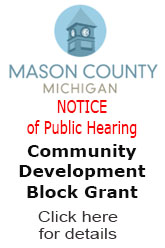 Health Department recommending coronavirus precautions.
Health Department recommending coronavirus precautions.
District Health Department #10 stated in a press release today that no cases of coronavirus (COVID-19) have been confirmed yet within the district’s jurisdiction, which includes Mason, Manistee, Lake, Oceana, Crawford, Kalkaska, Mecosta, Missaukee, Newaygo, and Wexford counties.
As stated by Gov. Gretchen Whitmer Tuesday, two cases are now confirmed in Michigan – one each in Wayne and Oakland counties. Both cases are hospitalized. Testing is ongoing: 15 individuals have tested negative in Washtenaw County, and 57 in Michigan as of today.
To date, DHD#10 has given three COVID-19 tests, all coming back negative for the virus. DHD#10 has monitored two people at medium risk for COVID-19 in our jurisdiction; one individual is past the 14-day monitoring period, and one individual is currently being monitored.
“DHD#10 continues to recommend prevention strategies,” the press release stated. “Hand washing is critically important to reduce the spread of illness, as is staying away from others when sick and maintaining ‘social distancing.’ Whenever possible in community settings or meetings, practice maintaining extra distance between people, up to 6 feet.
District officials are not recommending widespread closures or cancellations. “To date, there is no confirmation of a local case or possible community exposures within the DHD#10 jurisdiction. When or if this changes DHD#10 will issue additional recommendations or orders.
“The situation locally may change quickly. DHD#10 and your local county officials are relying on our communities to work together to slow the potential spread of illness and refer to official sources of reliable information.”
Response Actions
DHD#10 is working with health care providers to test individuals as needed. Individuals with concerns or symptoms should call their health care provider first with questions. Symptoms of COVID-19 include fever, cough, or difficulty breathing. Remember that these symptoms may also be caused by other viruses, such as flu. Additionally, an individual without symptoms is very unlikely to test positive, even with possible exposure.
DHD#10 continues to coordinate with federal, state, and local officials, as well as institutions, schools, and community organizations, to be ready for additional actions and communications should we have local cases.
We know this possibility of local cases may cause concern, and we are working to share timely, accurate information without causing unnecessary alarm.
Prevention
There is currently no vaccine to prevent coronavirus disease 2019 (COVID-19). The best way to prevent illness is to avoid being exposed to this virus. Information from Centers for Disease Control and Prevention (CDC) is available in English, Chinese, and Spanish.
- Clean your hands often
- Wash your hands often with soap and water for at least 20 seconds especially after you have been in a public place, or after blowing your nose, coughing, or sneezing.
- If soap and water are not readily available, use a hand sanitizer that contains at least 60% alcohol. Cover all surfaces of your hands and rub them together until they feel dry.
- Avoid touching your eyes, nose, and mouth with unwashed hands.
- Avoid close contact with people who are sick.
- Stay home when you are sick, except to get medical care. Call ahead before going to your healthcare provider. Learn what to do if you are sick.
- Cover your cough or sneeze with a tissue, then throw the tissue in the trash. Immediately wash your hands.
Clean and disinfect
- Clean and disinfect frequently touched objects and surfaces daily. This includes tables, doorknobs, light switches, countertops, handles, desks, phones, keyboards, toilets, faucets, and sinks.
- If surfaces are dirty, clean them. Use detergent or soap and water prior to disinfection.
- A list of disinfectants for use against SARS-CoV-2 (the virus that causes the COVID-19 disease) is available from the Environmental Protection Agency (EPA). This list includes many commonly used products.
Follow Center for Disease Control’s recommendations for using a face mask
If you are sick: You should wear a face mask when you are around other people (e.g., sharing a room or vehicle) and before you enter a healthcare provider’s office. If you are not able to wear a face mask (for example, because it causes trouble breathing), then you should do your best to cover your coughs and sneezes, and people who are caring for you should wear a face mask if they enter your room. Learn what to do if you are sick.
If you are not sick: You do not need to wear a face mask unless you are caring for someone who is sick (and they are not able to wear a face mask). Face masks may be in short supply and they should be saved for caregivers.
Older adults and people who have severe underlying chronic medical conditions like heart or lung disease or diabetes seem to be at higher risk for developing more serious complications from COVID-19 illness. View additional prevention steps from CDC for people at higher risk. Consult with your health care provider for more steps you may be able to take to protect yourself.
REMEMBER: Discrimination harms public health. People of Asian descent, including Chinese Americans, are not more likely to get coronavirus than anyone else.
Updates
This situation may change quickly. Refer to these sites for current information:
- District Health Department #10 updates: www.dhd10.org/coronavirus
- For questions, email: info@dhd10.org
- Michigan updates: www.michigan.gov/coronavirus
- National updates: http://www.cdc.gov/COVID19
Information in Multiple Languages
COVID-19 Fact Sheet from Michigan Department of Health and Human Services (MDHHS) – English, Traditional Chinese, Simplified Chinese, Spanish, Arabic

















.jpg)























 (1).gif)












.png)






